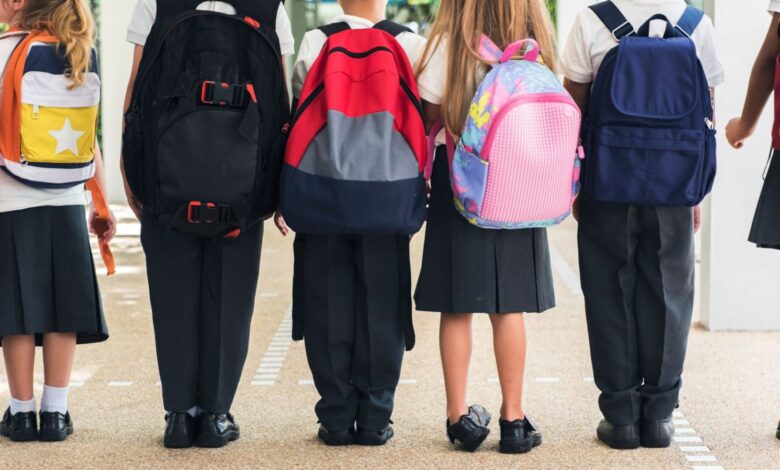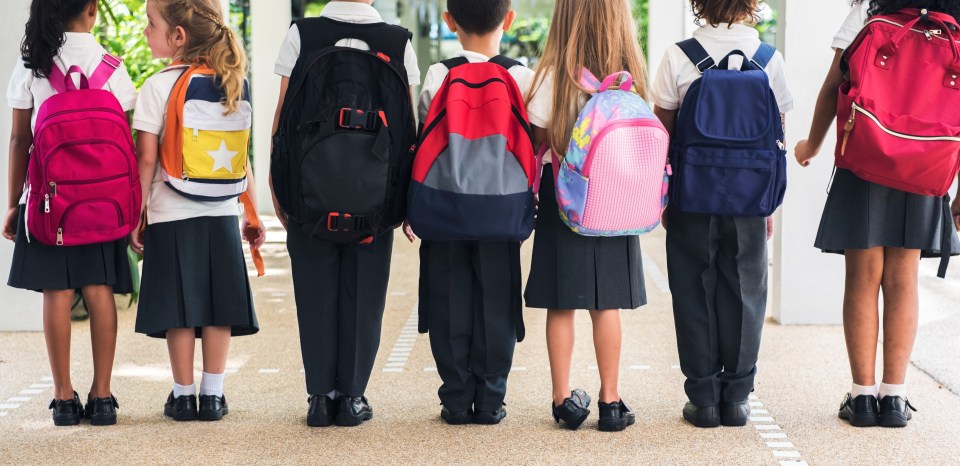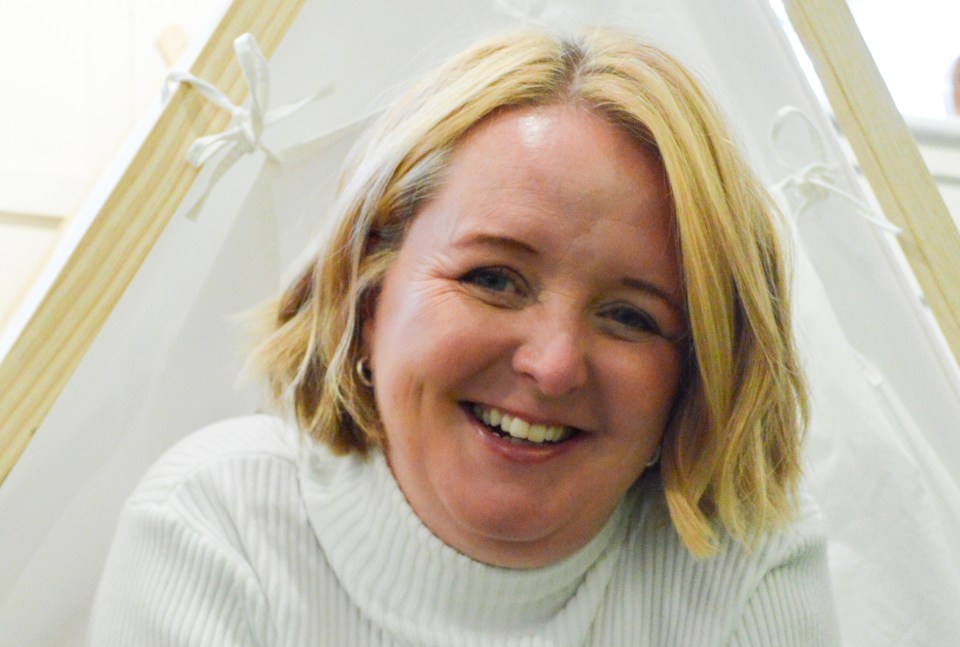The Covid kids starting school struggling to speak & still in nappies




THE first babies born at the beginning of the pandemic start school in England and Wales next month – and they face greater struggles than ever before.
We investigate why parents and experts are so concerned…
Natasha Wood lights up when she talks about her four-year-old daughter Alice*.
She describes a cheeky blonde whirlwind obsessed with cats, Paw Patrol and above all else, her big sister Rachel*.
But when talk turns to Alice starting school in September, Natasha’s smile falters.
She knows that her youngest will face challenges far beyond new friendships and lost cardigans.
“Alice was born in the pandemic and struggles with speech and language delays,” Natasha, a 33-year-old family support worker from Devon, explains.
“Years may have passed, but our family is still seeing the impact of Covid-19 today.”
And Natasha isn’t alone.
A growing number of concerned experts are warning that pandemic-born children starting school this autumn are facing significant issues.
“We’ve seen a huge rise in children presenting with delayed development following the pandemic,” says Catherine Joyce, national director for England at the charity Action For Children.
“There’s an increase in speech and language delays, as well as delays around motor skills, independence and self-care skills. Many of our staff report examples of children starting reception unable to feed themselves, and still in nappies. Some parents are also struggling with their child’s behaviour due to attachment issues and separation anxiety.”
In May this year, the UK Covid-19 Inquiry opened its investigation into the impact of the pandemic on children and young people, and one of its focuses is the effect on their physical and mental health.
According to a report released last month, more than 75,000 children in England are waiting for speech and language therapy – an all-time high – while over a quarter of a million children are waiting for mental health support, according to the Children’s Commissioner for England, among them the children born during the pandemic.
A survey published in March this year, which polled 1,000 staff in English and Welsh primary schools and 1,000 parents of children starting school, revealed that 24% of children were not toilet trained, 37% were unable to dress independently and 50% of staff felt young children were “far less prepared” for starting school compared to the previous 18 months.
‘Of children starting school this year, 24% aren’t toilet-trained and 37% can’t dress themselves’
Action For Children is part of The First 1,001 Days coalition, a collection of more than 200 UK charities and health professionals so worried about new school starters that they’re calling for more funding to help address the issue.
“Even before the pandemic, the developmental targets for two year olds were being missed,” says Parent-Infant Foundation chief executive Keith Reed, another coalition member.
“With the isolation of families and inability for those babies to see health visitors and other professionals in the pandemic, it only got worse. Throw in the cost of living crisis that followed, and it really has become a ticking time bomb.”
Alice was born in February 2020, just weeks before the UK was plunged into the first lockdown.
“My first daughter, Rachel, was almost two and a really easy toddler. I had a March 2020 due date and I naively thought: ‘I’ll be fine, I’ve got this,’” Natasha says.
However, after a diagnosis of pre-eclampsia, Natasha was induced at 36 weeks and had a traumatic birth, haemorrhaging four litres of blood.
Alice was born on February 19, 2020, weighing 6lb 1oz, and spent some time in the SCBU.
“It was all such a shock and for three weeks after we were discharged, we were back and forth to hospital. Seeing Boris’ announcement on March 23 that we were going into lockdown was scary. My partner Anthony, now 32, had to continue work as a steelwork fabricator, so it was me and the girls at home.”
‘By her first birthday we’d had three lockdowns, with masks and social distancing in between’
Like many people, Natasha believed lockdown would be over in a few weeks and, initially, it never crossed her mind that her newborn’s future development could be impacted.
Alice was seen by a health visitor before lockdown, who checked her weight.
But there was no six-week check-up – only a phone call with a GP who merely asked if everything was OK – and no four-month check-up either.
“There were no baby groups at the library, no visits from friends and family, no new mum meet-ups. Everything that Rachel experienced when she was born in February 2018 was gone. The only faces Alice saw properly were mine, Anthony’s and Rachel’s. By her first birthday, she’d lived through three lockdowns, with all the masks and social distancing in between. By then, it definitely worried me what the long-term impact on her would be.”
At 12 months, Alice wasn’t responding to her name
Mum Natasha
Alice had no problem with her physical milestones – she sat and crawled right on target.
But when it came to her hearing and speech, Natasha knew something wasn’t right.
“At 12 months, Alice wasn’t responding to her name. While at that age, her sister could understand me asking: ‘Where is the dog?’ and she’d point in reply. Alice didn’t.
“I mentioned it to the GP, who said she had an ear infection and gave her antibiotics.”
Natasha did her best to focus on Alice’s speech at home, and requested further investigations.
However, with the NHS facing a huge pandemic-related backlog, it took until April 2022, when Alice was two years and two months old, before she finally had a hearing test.
That’s when Natasha learned her daughter had two glue ears and below-average hearing, all while her speech was developing.
“I was so worried, especially as all they could do was refer her to audiology, and I knew that the pandemic and the huge spike in demand meant even longer waiting lists,” she says.
“While we waited for her to be seen, I’d have to translate for Alice around friends and family, because when she spoke it was very unclear. I felt as if I was constantly having to explain what was going on.”
Finally, in March 2024 when Alice was four, she was seen by an NHS speech and language team.
“That’s when we were told that Alice will struggle with school when she starts in September. Her hearing issues have resolved and she’s recently finished having speech and language therapy, but they have told us she won’t be understood and won’t cope well in a busy classroom environment when she starts.
“We can apply for more speech support for her, but it’s heartbreaking. Things could have been so different had my daughter not been born when she was, and we had been able to access support sooner.”
It’s a journey familiar to research psychologist and child development expert Dr Amanda Gummer.
“The first year is crucial for a child, as this is a period of rapid brain growth and foundational skill-building. Attachment, sensory experiences, and early interactions form the basis for future cognitive, social, and emotional development.”
She says that missed intervention opportunities during the pandemic have exacerbated developmental issues for many.
“Early intervention is so important, and the lack of access to specialists during the pandemic has meant that some children missed critical windows for support. These delays can become more pronounced and challenging as time passes.”
She also says that the impact of the pandemic on a child’s ability to make friends and build emotional resilience can be just as significant.
“Limited interaction with peers and adults outside the immediate family has hindered social and emotional development. We can’t be sure what the long-term impact of the delays will be on these children, and on their social skills and self-esteem in the future.”
‘If someone tried to talk to my daughter, she’d cling to me in distress’
That rings all too many bells for Kristal Fisher, a stay-at-home mum from Manchester.
Her joy at becoming pregnant in November 2019 turned to fear when the pandemic began.
“Hearing about Covid-19 in February, at four months pregnant, was really scary. With my anxiety growing, I wasn’t in a great place even before Ellie* was born. Then, after an emergency caesarean in July 2020, I developed postnatal depression. Because of the pandemic, there wasn’t proper support. I was eventually sent home, and despite living with my parents, I found it a huge struggle,” she says.
Under normal circumstances, there would have been wider family, friends, baby groups and health visitors for Ellie to interact with, and for Kristal to lean on for support.
“The pandemic meant that simply didn’t happen, and in my anxiety, I just held Ellie close. Spending all our time together did create an incredible bond, but I became her whole world.”
As things slowly began to open up, Kristal realised how much Ellie was overwhelmed by strangers.
“If someone tried to talk to her, she’d cling to me in distress. Even when we were at home, she’d cry as soon as I put her down. I called her my little koala because she wanted to be in my arms all the time.
“As the years passed, she still struggled to go beyond the incredibly strong bonds she had with me, my parents and her dad. If we tried to get her out of that bubble to play with other children at a playground, she’d be completely overwhelmed and have a meltdown.”
Even now, her social delays mean she (Ellie) doesn’t really interact with other children and often ignores their attempts to play with her
Mum Kristal
Then, in November 2022 Ellie’s sister Lily* was born.
“The difference was incredible. I only truly understood what Ellie had missed out on when I saw all the experiences Lily had and how easily she socialised,” Kristal confesses.
She has done her best to help Ellie develop social confidence at home and, last year, her daughter began preschool for three hours each day.
“Ellie is such a loving girl, but she still struggles. Even now, her social delays mean she doesn’t really interact with other children and often ignores their attempts to play with her.”
The new school term approaching is making Kristal anxious.
“Once Ellie starts, I won’t have the choice to keep her at home if she’s having a bad day. I’ve even considered homeschooling her, but worry it would do her more harm than good.”
Clinical psychologist Frankie Harrison says that supporting a child through pandemic-related delays can have a significant impact on the wellbeing of parents.
“While in the throes of the pandemic, parents experienced a high level of stress themselves. But seeing those developmental delays years later can create both grief for the experience you and your child should have had, as well as self-blame – a feeling you should have done more, and that if you had been able to, perhaps they wouldn’t be struggling now. They can be very difficult feelings to navigate, made harder by a culture of toxic positivity that tells us to just be grateful and move on.
“The feelings remain, but just bubble away, unresolved, under the surface.”
‘In these final few days before term starts, stay positive and help your child get school-ready’
Alex Corgier, perinatal and infant mental health lead at Home-Start, is keen to reassure parents, however.
“Not every child born during the pandemic is struggling – many are doing brilliantly and hitting all their developmental milestones. And even if your child did slow down because of the pandemic, they are incredibly resilient and can absolutely bounce back.”
Building good relationships and having open communication with the school can make a huge difference, she says.
“In these final few days before term, stay positive and help your child get ‘school ready’.
Practise putting on their uniform and talk about what they might like for school lunches. Making it fun will help you both.”
Meanwhile, Keith says it’s the new Labour government that has the real homework to do.
“The funding for Start For Life, which runs family hubs in local authorities and offers support to parents and carers, is due to end in March 2025. We’re calling for funding to be continued. Years may have passed since the pandemic, but we must keep supporting families,” he explains.
Natasha agrees.
“We can’t just brush this under the carpet. I still grieve for the experience that Rachel, Alice and I should have had – that precious window of the girls’ lives that we lost.
“Along with many other children starting school this autumn, Alice is still paying the price of the pandemic,” she adds.
“We owe it to this generation and their parents to help them overcome the hurdles the pandemic placed in the way of their development. Otherwise, what will their future look like?”
*Names have been changed







